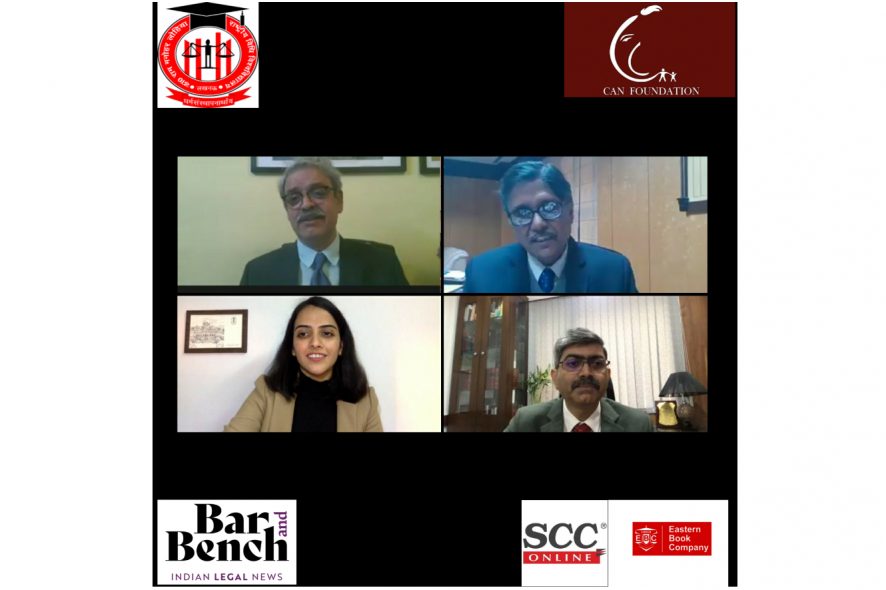Dr. Ram Manohar Lohia National Law University, Lucknow (RMLNLU) & Confederation of Alumni for National Law Universities (CAN Foundation) hosted a webinar on “Bail & Jail: The Rule & The Exception”. The Panelists were Justice Siddharth Mridul, Judge,  Delhi High Court; Justice Atul Sreedharan, Judge, Madhya Pradesh High Court, Mr. Siddharth Luthra, Senior Advocate, Supreme Court of India and Prof. (Dr.) S.K. Bhatnagar, VC, RMLNLU. The webinar was moderated by Mr. Amit Anand Tiwari, AOR, Supreme Court of India and Ms. Vidhi Thaker, Law Clerk and Research Assistant, Supreme Court of India.
Delhi High Court; Justice Atul Sreedharan, Judge, Madhya Pradesh High Court, Mr. Siddharth Luthra, Senior Advocate, Supreme Court of India and Prof. (Dr.) S.K. Bhatnagar, VC, RMLNLU. The webinar was moderated by Mr. Amit Anand Tiwari, AOR, Supreme Court of India and Ms. Vidhi Thaker, Law Clerk and Research Assistant, Supreme Court of India.
Prof. (Dr.) S.K. Bhatnagar began his Welcome Address by thanking CAN Foundation and appreciated the relevance of the topic of the webinar in contemporary times. He elaborated on the concept of liberty as enshrined in The Constitution of India, 1950. He commented that research of Article 20 has been expanded beyond imagination. Article 21 stands wide between Article 20 and 22. Liberty under this article is qualified with the term ‘personal’. It makes it clear that the framers were concerned with physical liberty which was also emphasised by Prof. Bhatnagar in light of today’s topic.
Justice Siddharth Mridul began his address by saying that individual rights, bail and constitutional rights are all interlinked concepts. He began with the history of bail jurisprudence. Throughout history, there was a lot of struggle which later metamorphosed as the struggle between citizens and the executive, in a quest for achieving personal liberties. He referred to an ‘Ashokan Rock’ edict on personal liberty and the role of the King. Even in Kautilya’s Arthashastra, it is stated, he said that only the rule of law can guarantee liberty and security.
He quoted John Stuart Mill that the protection of liberty has been considered as a fundamental duty of the State in many civilizations. ‘Cyrus the Great’, best known as the liberator of Jews who had been incarcerated in Babylonia by Assyrians, is accredited for the discovery of a cylindrical object called the Cyrus cylinder. The cylinder inscribed the duties of the king and the rights of the subjects. So even as far back as 3000 years, there were enlightened individuals who thought about the rights and liberties of individuals. He remarked that we should remember that the rights of individuals are threatened when the rights of one individual diminish.
He described how personal liberty evolved in Britain. The Magna Carta was drafted as a result of conflict between subjects and King John. The principle of vis-a-voluntatis was prevalent then as per which the King was the repository of all strength and wisdom and thus, was above law. It is due to these beliefs and principles, King John ran into troubles with his subjects and as a result of loss in the battlefield, he had to promise his subjects ‘rights’ as a result of which this great charter came about. It became the foundation for contemporary principles of parliament and remedies like Habeas Corpus. It gave rights to subjects against illegal imprisonment.
However, later it was annulled by Pope Innocent III. Towards the end of the 16th century, there was again an upsurge in interest for Magna Carta. Clauses of Magna Carta were numbered in 63 categories and thus, Magna Carta became synonymous to individual liberty.
Justice Mridul also highlighted how lLater Blackstone’s commentary on the same inspired the American Constitution. The importance attached to this right could be seen by the fact that even in the absence of The Bill of Rights, 1689 various provisions were provided for protection of individual liberty. Further, in the amendments to the Bill of Rights, it can be seen that all changes were focused on the procedural aspects of the right to a speedy and free trial and the right to bail, in order to enhance them.
Coming to the Indian context he talked about the growth of Article 21 of the Constitution which has been a great enabler for protecting the personal liberties of the citizens of India. Personal liberty is paramount to human dignity. The manner in which the right was expanded immediately after independence really laid the foundation for the freedoms we enjoy today. Erudite personalities have been on the bench who have helped in the expansion of this right.
While speaking about Personal Liberty in the Indian Constitution, Justice Mridul said that the journey of Indian Constitution began with the Constituent Assembly Debates and that Dr. BR Ambedkar’s draft said that Life and Liberty could not be deprived except by a due process of law. He further added that the due process did not find a place in the Constitution, but we moved ahead and read due process into Article 21. Justice Mridul also said that the concept of Bail as a Constitutional safeguard serves as the end of personal liberty and justice
Justice Mridul, while speaking about Presumption of Innocence, said that the concept of bail as a Constitutional safeguard for the protection of liberty emerged from the conflict between police power and presumption of innocence in favour of the accused. Justice Mridul also quoted that the Canadian Supreme Court had held that the denial of bail had a detrimental effect on the presumption of innocence and personal liberty.
In summation, Justice Mridul pointed out that bail was necessary because the detention was to ensure the accused is present during the trial, and if that presence could be ensured without detention, then it would not be advisable to deny bail.
Justice Mridul said that the Right to bail today is a Constitutional recognition of personal liberty and an extension of presumption of innocence
On a Question by Moderator, Amit Anand Tiwari about the nature of conditions the Court imposes including sureties, It is often observed in Tihar Jail that many are not able to secure bail because they are unable to furnish securities. Justice Mridul replied that not only for bail but even the outcome of a trial has also been impacted due to the economic status of the accused. That is why the Delhi High Court is trying through Legal Services Authorities to ensure that the accused gets the best representation at the trial. The Supreme Court has also said that imposing economic sanctions as a condition to secure appearance for trial impairs liberty and access to justice in a country where a lot of people are impoverished. Therefore, we must take initiatives to ensure that fair trials of the economically weak are not impacted due to lack of financial security. Courts must, therefore, carefully consider the financial situation of applicants before the grant of bail.








As always is the case in our country, theory and practice differs, take the case of Faruqui the stand up comedian in MP.